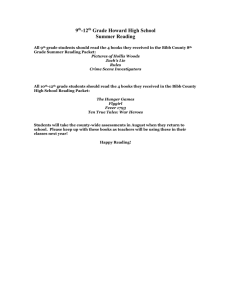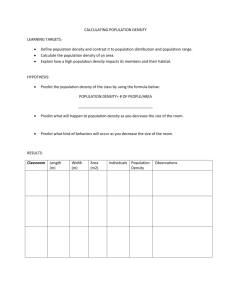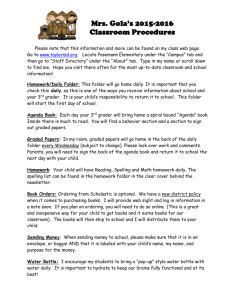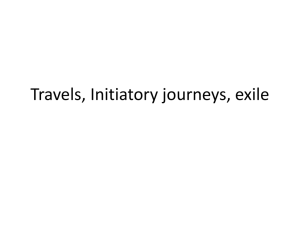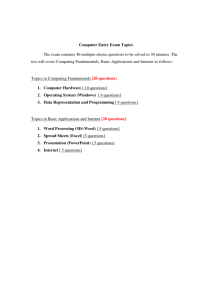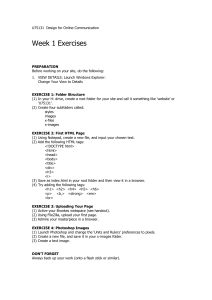mathematics - Bibb County Schools
advertisement
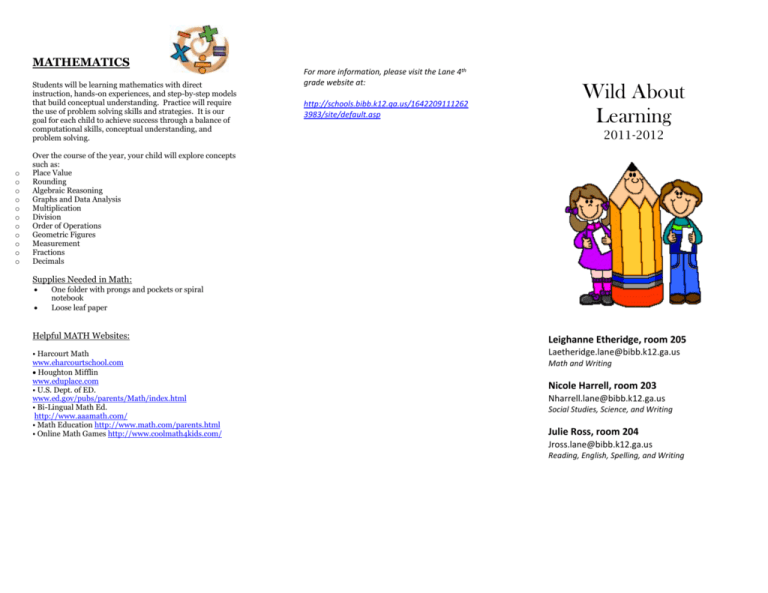
MATHEMATICS Students will be learning mathematics with direct instruction, hands-on experiences, and step-by-step models that build conceptual understanding. Practice will require the use of problem solving skills and strategies. It is our goal for each child to achieve success through a balance of computational skills, conceptual understanding, and problem solving. o o o o o o o o o o o For more information, please visit the Lane 4th grade website at: http://schools.bibb.k12.ga.us/1642209111262 3983/site/default.asp Wild About Learning 2011-2012 Over the course of the year, your child will explore concepts such as: Place Value Rounding Algebraic Reasoning Graphs and Data Analysis Multiplication Division Order of Operations Geometric Figures Measurement Fractions Decimals Supplies Needed in Math: One folder with prongs and pockets or spiral notebook Loose leaf paper Helpful MATH Websites: • Harcourt Math www.eharcourtschool.com Houghton Mifflin www.eduplace.com • U.S. Dept. of ED. www.ed.gov/pubs/parents/Math/index.html • Bi-Lingual Math Ed. http://www.aaamath.com/ • Math Education http://www.math.com/parents.html • Online Math Games http://www.coolmath4kids.com/ Leighanne Etheridge, room 205 Laetheridge.lane@bibb.k12.ga.us Math and Writing Nicole Harrell, room 203 Nharrell.lane@bibb.k12.ga.us Social Studies, Science, and Writing Julie Ross, room 204 Jross.lane@bibb.k12.ga.us Reading, English, Spelling, and Writing READING/ELA WRITING 4th grade reading is designed to help students develop a lifelong love of reading. We will strive for each student to be reading and comprehending text above grade level before the end of the year. Writing is a wonderful way to communicate and express yourself, and fourth grade will begin the journey into the world of written expression. Over the course of this year, your child will continue to explore the writing process while writing narratives, nonfiction essays, persuasive essays and creating responses to literature. HOMEWORK: All students are expected to read a MINIMUM of 30 minutes at home daily. Students will be expected to track their reading and respond to their reading assignments. Students should read “just right” books that they can read successfully while still being challenged by the material. We will be moving very rapidly so it will be essential that your child READ! READ! READ! Grammar & Spelling homework will be assigned MOST nights. SUPPLIES for Reading: One Folder with Prongs At least 2 sharpened pencils Accelerated Reader: All students are required to read at least 6 AR books per grading period and take AR tests on those six books. At least 2 of the 6 AR grades should come from chapter books. The top six AR grades per grading period are recorded as a reading grade. AR books that are recorded as grades must be on the child’s current grade level or higher. A failing score can be replaced by a passing score just by reading and taking another test. In fourth grade, AR book grades are taken from three sources. First, books that are on the current grade level or above are graded. Second, stories from the Fourth Grade Reading Series are graded. Third, your child will be doing reading activities out of guided reading books. Guided reading books are leveled depending on difficulty and text features. Your child has been placed in a guided reading level based on their current needs and they will progress through the levels as they achieve success in the previous level. Fourth grade students who are working in level P or higher will have their AR tests for those levels graded. Encourage Your Child To: Write in a journal Write letters or notes Write emails Create a list Read a variety of books Supplies Needed in Writing: One Folder with Prongs SCIENCE The science program in fourth grade encompasses the water cycle, weather, light and sound, force and motion, the solar system, and ecosystems. The scientific method will be used often as students use experimentation along with research, observation, writing, and discussion. There are a variety of texts and hands-on kits to cover each topic. Helpful Websites: • Ask a Scientist http://www.madsci.org • Inventive Kids http://www.inventivekids.com/indexFlash.html • NASA Science http://earthobservatory.nasa.gov/ • Online Weather School http://www.srh.noaa.gov/srh/jetstream/ • The Science Club http://scienceclub.org/kidfun.html • Simple Machines http://www.mikids.com/Smachines.htm Supplies Needed in Science: One Composition Notebook One Folder with Prongs SOCIAL STUDIES The world of social studies is intriguing! There are several reoccurring themes in 4th grade social studies. The reoccurring themes are beliefs and ideas, conflict and change, distribution of power, individuals, groups, and institutions, location, movement and migration, and technological innovations. Over the course of this year, your child will repeatedly explore those themes during each historical unit. The historical units are as follows: Native Americans European Explorers Colonial America The Revolutionary War A New Nation Westward Expansion The Civil War These historical units will be explored in conjunction with geography, government, and economics strands. Study Tips for Social Studies Read class notes daily Create vocabulary flashcards using index cards Study with a friend or parent Read books about the current unit Use the internet (with parents permission) to discover more information on the unit of study Helpful Websites Scott Foresman Building a Nation: www.sfsocialstudies.com GA DOE (Standards for all content areas): http://www.doe.k12.ga.us Smithsonian Institution: http://www.si.edu/harcourt/socialstudies Supplies Needed in Social Studies: One Folder with Prongs One Spiral Notebook (Optional)
